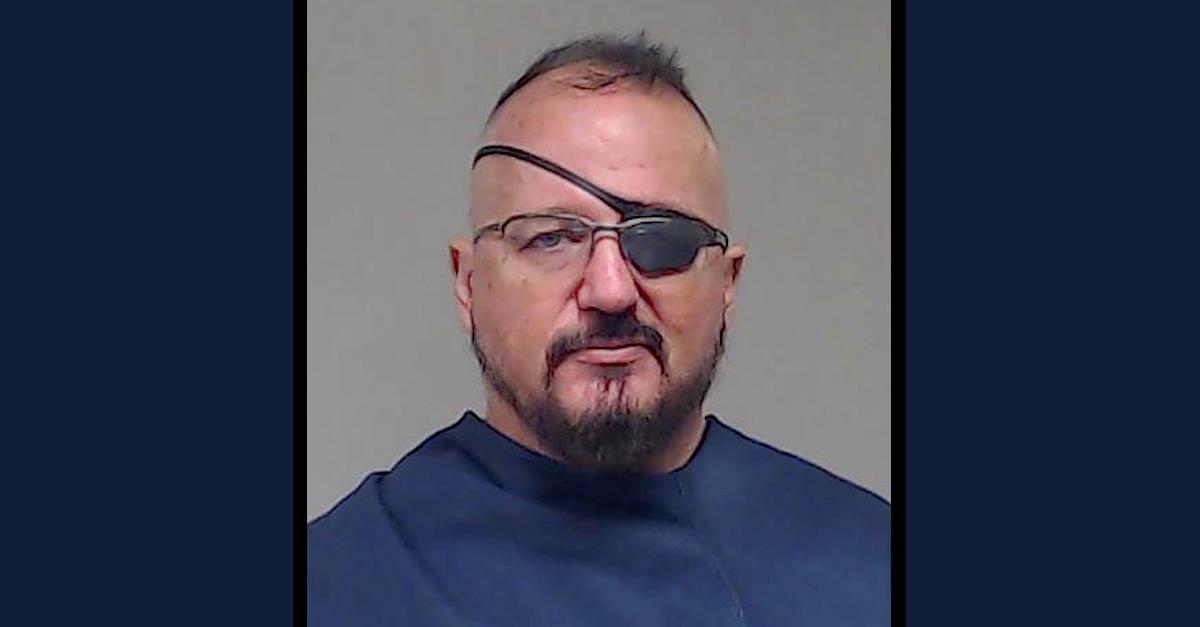
‘Oath Keepers’ leader Stewart Rhodes appears in a Collin County, Texas jail mugshot.
Finding the Oath Keepers founder Stewart Rhodes could present a “credible threat” to the public, a federal judge on Wednesday ordered him to remain behind bars pending trial on blockbuster seditious conspiracy charges in the Jan. 6 investigation.
Earlier this month, prosecutors unveiled their indictment charging 56-year-old Rhodes and 10 members of his far-right extremist group with the seditious conspiracy statute. Of the more than 725 people charged on the Jan. 6 docket, Rhodes and his militia members are the only defendants to date to be prosecuted for that offense.
In urging his pre-trial incarceration, prosecutors argued Rhodes and his accused co-conspirators posed a uniquely serious threat to the public.
“It is difficult to imagine conduct that poses a graver risk to our society than one targeted at undermining the laws and procedures at the heart of our democratic process—and doing so with force,” Assistant U.S. Attorney Kathryn L. Rakoczy wrote on Jan. 20.
“Elaborate Escape Tunnels”
On Wednesday, U.S. Magistrate Judge Kimberly C. Priest Johnson found Rhodes too dangerous to release.
“Defendant’s authoritative role in the conspiracy, access to substantial weaponry, and ability to finance any future insurrection, combined with his continued advocacy for violence against the federal government, gives rise to a credible threat that Defendant’s release might endanger others by fostering the planning and execution of additional violent events,” the judge wrote in a 17-page ruling. “This is especially so given Defendant’s technical savvy, military training, and familiarity with encrypted communication; it is nearly impossible to effectively monitor communications made through encrypted messaging and video conferencing applications, which Defendant is known to use. Finally, there is some evidence of a propensity towards violence in Defendant’s personal relationships.”
According to the ruling, Rhodes’s estranged wife Tasha Adams contacted the court after his detention hearing, telling the judge that she feared for her safety and the safety of her six children if he were released.
Telling the court that Rhodes spoke of his fear of being “picked up by the feds,” Adams told the judge that her estranged husband installed “elaborate escape tunnels” in their backyard. Rhodes also hid “unregistered cars in the woods, and purchased hundreds of dollars of razor wire, which Defendant intended to install around the perimeter of the property, concealed from view, ‘in case the feds ever came to his door,'” according to the ruling.
“On balance, the evidence in the record overall indicates Defendant’s release could endanger the safety and well-being of others,” the order states.
Edward Vallejo, a 63-year-old charged with Rhodes, was denied pre-trial release on Jan. 20.
“This was a very strong threat to our nation,” U.S. Magistrate Judge John Z. Boyle said during Vallejo’s detention hearing, referring to the Jan. 6 attack on the U.S. Capitol.
Boyle added at the time: “There is compelling evidence about your potential for danger.”
“Massively Bloody”
Prosecutors say that Rhodes and other Oath Keepers members “planned to stop the lawful transfer of presidential power by January 20, 2021, which included multiple ways to deploy force.”
“They coordinated travel across the country to enter Washington, D.C., equipped themselves with a variety of weapons, donned combat and tactical gear, and were prepared to answer Rhodes’s call to take up arms at Rhodes’s direction,” the 48-page indictment states.
In the days leading up the siege of the U.S. Capitol, Rhodes allegedly went on a spending spree. Prosecutors say that Rhodes bought night-vision devices and one weapon sight for about $7,000 on Dec. 30, 2020.
After the new year into 2021, Rhodes allegedly shopped for weapons nearly every day, purchasing firearms and related equipment for $5,000 on Jan. 1 and 2; an AR-platform rifle and equipment for $6,000 in Texas on Jan. 3; and more firearms equipment in Mississippi on Jan. 4.
All told, the judge estimated Rhodes spent upwards o $40,000 on firearms, ammunition, and firearms-related accessories, parts, and equipment.
“Defendant repeatedly referred to the Oath Keepers’ actions both in the Raid and in communications thereafter as inciting a revolution or civil war, which, according to those communications, had the potential to be massively bloody,” the ruling states.
Prosecutors say that the Oath Keepers prepared an elaborate plot to store a cache of weapons in a Comfort Inn just outside of Washington, D.C., where a so-called “Quick Reaction Force” allegedly stood ready to deploy by boat over the Potomac River at former President Donald Trump’s direction.
The indictment shows Rhodes signing off on the plan for a so-called “QRF”—which was never actually launched.
“We WILL have a QRF, this situation calls for it,” Rhodes wrote in an encrypted message on Signal, according to his indictment.
If convicted of seditious conspiracy, Rhodes faces up to 20 years imprisonment, but he faces even tougher sentencing exposure if found guilty of additional charges of conspiring to obstruct an official proceeding, obstructing an official proceeding, conspiring to prevent an officer from discharging any duties, and tampering with documents. He has pleaded not guilty to the charges.
Read the ruling, below:
(Image via mugshot)